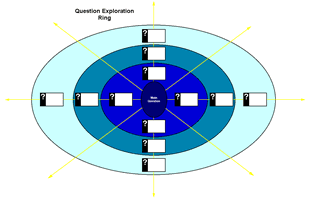Question Evolution
 Questioning is an ongoing activity of the student information scientist across information inquiry situations. The scientist might ask him or herself the following questions:
Questioning is an ongoing activity of the student information scientist across information inquiry situations. The scientist might ask him or herself the following questions:
- How did your research questions evolve over the information search process? Document what you learned in each new source that may have influenced your questions and illustrate this inquiry evolution.
- How did your questions change after conversations with your teacher?
- Presenting your idea to your classmates? Illustrate how the questions clustered into groups for various investigations. Show how the questions became more detailed, specific, or interesting as you explored more background information.
At what point did you know you had the question you wanted to focus on for your inquiry project? Given your experience, what criteria are most important in determining a constructive inquiry project for you? Visual below provides a generic framework for students to illustrate question evolution through exploration of print, nonprint and human resources. Similar to concept maps, students can illustrate how an initial question expands and evolves as a new information source (book, website, human, video, etc.) is introduced. Each new ring represents a new set of questions derived from a new source and linked back to the initial question.
Click the visual above to enlarge.
Becoming proficient at the use of questioning is associated with the following Information Literacy Standards (AASL, 1998):
- The information literate student accesses information efficiently and effectively.
- The information literate student evaluates information critically and competently.
- The information literate student uses information accurately and creatively.
- The information literate student is an independent learner and pursues information related to personal interests.
- The information literate student is an independent learner and strives for excellence in information seeking and knowledge generation.
- The information literate student contributes positively to the learning community and to society and practices ethical behavior in regard to information and information technology.
- The information literate student contributes positively to the learning community and to society and participates effectively in groups to pursue and generate information.
The following example demonstrates how a student matures as he or she gains experience and expertise.
Immigration
 The information skill level of students can impact the complexity of question evolution. As student questions become more sophisticated and multidimensional, they may require more diverse resources and varied investigations.
The information skill level of students can impact the complexity of question evolution. As student questions become more sophisticated and multidimensional, they may require more diverse resources and varied investigations.
A beginning information scientist may not consider how their questions could be expanded or enhanced. A novice questioner investigating immigration may ask: “How did people get to America?” and “From where did these people come?” As they gain questioning skills, their investigation may expand to “Why did people come to America?”
As student information scientists become more sophisticated, they seek ways to add depth and interest to their questions such as “How was the immigration experience different for varied ethnic and cultural groups? Why?”, “Why did people select particular areas for relocation?”, “How has the immigration experience changed over the history of North America?”, “Who in our neighborhood is an immigrant? What was their experience like? How does it compare to others?”
Explore Maya's investigation for more detail.

